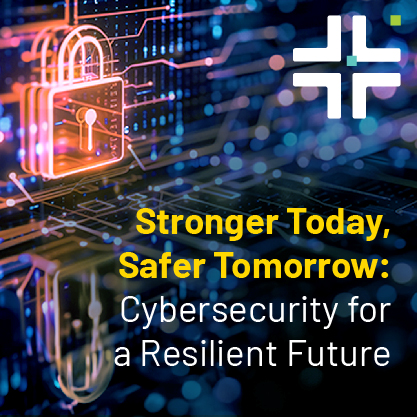In an increasingly digital world, the line between personal and professional lives has blurred, making cybersecurity a shared responsibility that extends beyond the workplace. October marks Cybersecurity Awareness Month, a timely reminder for leaders across all industries to take actionable steps toward safeguarding both personal and business information. There are simple yet effective everyday practices that can strengthen your defenses against cyber threats.
Building a Cyber-Resilient Business
For businesses, cybersecurity is not just an IT issue – it’s a leadership issue. The stakes are higher, and the consequences of a breach can be devastating. Beyond financial losses, businesses risk damaging their reputation and losing customer trust. Leaders must champion cybersecurity by promoting a culture that prioritizes safety and resilience.
Let’s review some essential practices to enhance business cybersecurity:
- Update and Modernize Software Regularly: One of the first steps in securing your business is to update and modernize software regularly. Outdated systems are a playground for hackers, who exploit vulnerabilities that may have been patched in newer versions. Regular updates ensure that your systems are equipped to fend off the latest threats.
- Conduct Regular Audits and Assessments: Scheduled audits and assessments will also allow your business to proactively identify and address potential security gaps. These evaluations help ensure that all security measures are up to date and functioning correctly, providing an additional layer of assurance against cyber threats.
- Implement Ongoing Training and Education: Technology alone isn’t enough. A resilient future requires a prepared present, so ongoing training and education are essential. Employees should be regularly trained to recognize cyber threats, understand the importance of strong passwords and to report suspicious activity immediately. This consistent vigilance can prevent minor issues from escalating into significant breaches.
- Use Strong Passwords and Enable Multi-Factor Authentication (MFA): Weak passwords can be easily cracked by cyber criminals – granting them access to sensitive company information and communication channels. Encourage employees to create complex passwords, utilize password managers and regularly change their credentials. This simple yet effective practice significantly bolsters your organization’s cybersecurity defenses.
Additionally, enabling multi-factor authentication (MFA) adds an extra layer of protection, requiring a password and a secondary verification method such as a text message or an authentication app. Ensure that MFA is deployed across all critical systems, including email and collaboration tools. This helps mitigate risks by making unauthorized access significantly harder. - Have a Backup Plan: Businesses, regardless of size or industry, must prioritize a cybersecurity backup plan. Cyber threats are ever-evolving and can target anyone – making it imperative for companies and their executives to be prepared for potential breaches. A robust backup plan ensures that critical data can be restored swiftly, whether on a business or personal device; minimizing downtime and financial losses. It safeguards the organization's reputation by demonstrating a commitment to data security, which is increasingly important to customers, clients, employees and partners alike.
Strengthening Individual Cybersecurity
Cyber threats don’t just target large corporations – they’re also aimed at their leaders and individuals, often using the same sophisticated techniques. One of the most common and effective tactics employed by cybercriminals is phishing. Whether it’s a seemingly harmless email or a text message claiming to be from a trusted source, the goal is to trick you into revealing sensitive information. Be alert about unexpected messages; if something feels off, it probably is.
To recognize phishing attempts, look for red flags such as unsolicited requests for sensitive information, mismatched email domains or generic greetings that do not address you by name. When in doubt, play it safe. Do not click on suspicious links or download attachments; instead, report the phishing attempt to your IT department or the appropriate authorities. By staying vigilant and proactive, you help protect not only yourself but also your organization from potential cyber threats.
Another cornerstone of personal cybersecurity is password management. Using strong, unique passwords might seem like an obvious step in securing your accounts, but it’s a crucial practice that many overlook or get complacent about. Consider employing a password manager to keep track of these credentials, reducing the temptation to reuse passwords across multiple sites.
To further enhance your personal security, implement multi-factor authentication (MFA) wherever possible. This extra step makes it significantly harder for attackers to gain unauthorized access to your accounts. Do not approve an MFA authentication if you are not attempting to log into a website or app.
A Unified Approach to Cybersecurity
Embracing a proactive and unified approach to cybersecurity, whether at the individual or organizational level, strengthens our defenses against evolving threats. Simple, consistent practices such as regular software updates, robust password management and vigilant use of multi-factor authentication are not just technical steps; they are foundational to building a culture of security. By integrating these practices into your daily routine, you contribute to a safer digital environment for yourself and your organization.
Withum believes in empowering clients to build a resilient future through a prepared present. As we observe Cybersecurity Awareness Month, let’s commit to securing our world one step at a time.
Contact Us
For more information on this topic, please contact a member of Withum’s Cyber and Information Security Services Team.




